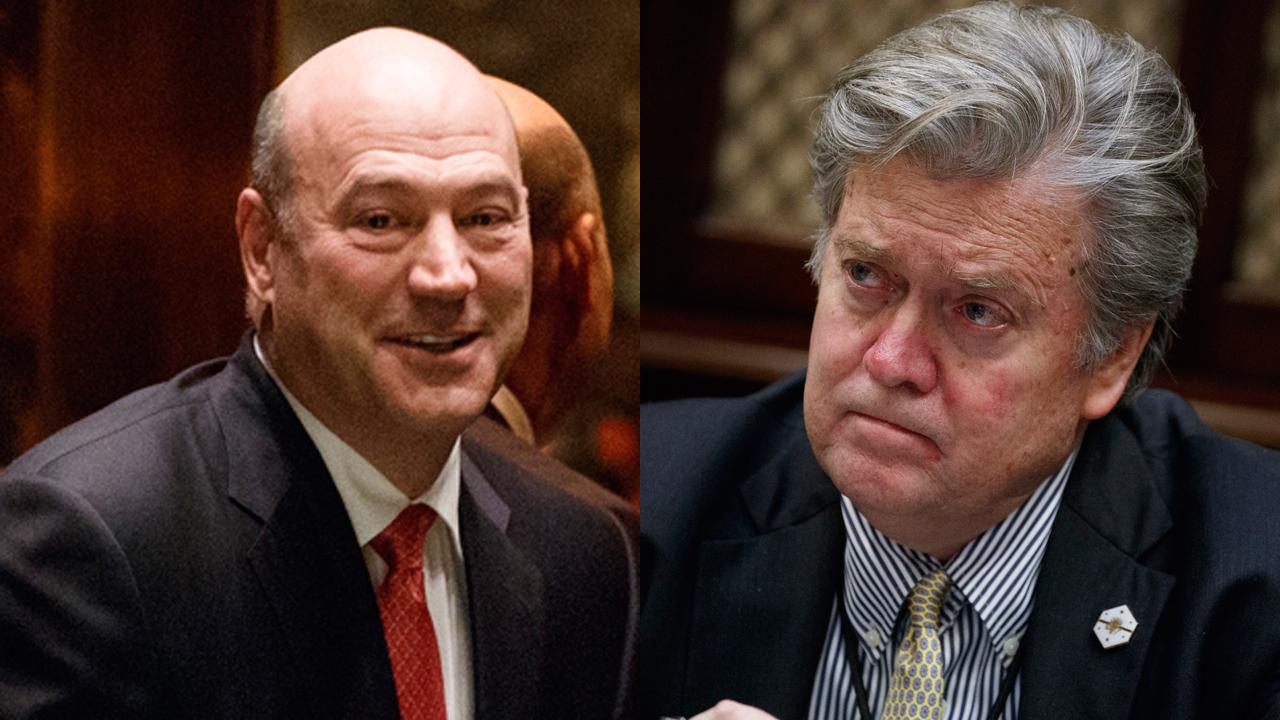Cohn vs. Bannon: Feud Escalating Over Trump's Tax & Economic Policy
A bitter policy fight between two of President Trump’s top aides that began with disagreements over trade policy has now expanded into other areas of the White House’s economic agenda, setting the stage for the first major showdown between senior officials of the nascent administration, the FOX Business Network has learned.
The feud between Trump’s senior adviser Steven Bannon, and Gary Cohn, who heads the president's National Economic Council, represents the first major policy rift of the Trump White House, according to people with direct knowledge of the matter. People who know both men say that while they maintain a cordial, friendly relationship, particularly in front of their boss, they have begun to skirmish over key aspects of the administration's economic and tax policy in addition to trade, which has been widely reported.
These people say the Bannon-Cohn rift has easily eclipsed some of the initial tension between Bannon and Trump's Chief of Staff Reince Priebus because it involves substantive policy matters, rather than more petty personnel matters. The loser could be the first major casualty of the Trump administration among his senior staff, these people add.
White House spokeswoman Hope Hicks denied that there is any ongoing feud between Bannon and Cohn, but she refused to elaborate when pressed on specific issues such as their positions on the border adjustment tax, the carbon tax and trade, where people close to the White House say both men have offered competing positions.
On the face of it, both men seem to share a lot in common; before joining the Trump administration, Cohn was the No. 2 executive at Goldman Sachs (NYSE:GS), while Bannon was once an investment banker at the prestigious Wall Street firm.
But on policy they are miles apart. Cohn is a registered Democrat and one-time supporter of President Obama. He has advocated free trade, and other so-called globalist remedies to economic problems and largely supported Obama's domestic policy agenda, which included higher taxes, universal health coverage and a pathway to citizenship for some illegal immigrants.
Cohn broke with the former president later in his tenure but only after the Obama administration implemented a series of Wall Street reforms that squeezed Goldman's profits.
Bannon, the former chief executive of conservative news outlet Breibart, is an economic nationalist, and one of the key architects of president Trump’s campaign positions that eschewed trade deals such as the the North American Free Trade Agreement (NAFTA), while advocating lower taxes and smaller government. He has spoken out against unfettered immigration as well as the power of the big banks in shaping government polices and the bailouts they received in the aftermath of the 2008 financial crisis.
Indeed, Bannon helped shape then candidate Trump's attacks against big banks like Goldman during the 2016 presidential race.
Now, those differences are spilling over into a policy dispute that has engulfed certain aspects of the administration’s economic policy agenda, these people say. In recent weeks, the two have sparred over the so-called border adjustment tax (Bannon is for it, Cohn is not), a possible carbon tax (Bannon is against it; Cohn supports it) and various trade issues, according to people with direct knowledge of the matter.
The proposed border adjustment tax would lead to a tax on imports, while the carbon tax levies a tax on emissions from fossil fuels.
“Bannon’s viewpoint is that America should be first and full speed ahead. Anything on a carbon tax or anything similar is a conflict to that belief and it’s not surprising Bannon and Cohn are feuding over this particular topic,” said Democratic political consultant Hank Sheinkopf.
President Trump, of course, will make the final decision on determining policy and the people implementing that policy, and he has provided few clues on where he's siding. Both Bannon and Cohn can be seen regularly in public with the president, who has told people he is fond of both of them. In terms of policy, details will be rolled out shortly as the Trump administration unveils its budget priorities and tax plans.
How Bannon and Cohn became senior officials in the Trump administration speaks to the president's unorthodox management style, where he appoints people to key positions often based on gut and personal relationships.
While Trump was naturally attracted to Bannon's political and economic policies, he is said to be fond of Cohn’s assertive management style and stature; while at Goldman, Cohn was an imposing figure on the firm's trading floor and later as a top executive, where he was regarded as the heir apparent to the firm's chief executive Lloyd Blankfein.
But now Trump's management style is being put to the test on economic issues as Bannon and Cohn compete for the president's ear. "Steve and Gary like each other personally but on policy they couldn’t be more different," said a person with close ties to the Trump White House who asked for anonymity.
Said another person who regularly advises Trump: "They may like each other but the situation is getting toxic and nobody wants to get in between that feud.”




















